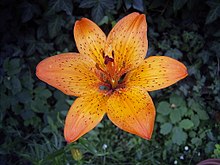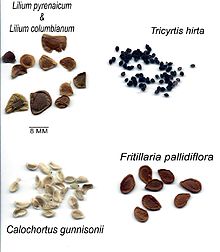Lily family
| Lily family | ||||||||||||
|---|---|---|---|---|---|---|---|---|---|---|---|---|

|
||||||||||||
| Systematics | ||||||||||||
|
||||||||||||
| Scientific name | ||||||||||||
| Liliaceae | ||||||||||||
| Yuss. |
The lily family (Liliaceae) are a family of monocotyledons (monocotyledons). The approximately 16 genera with approximately 630 species are common in the temperate areas of the northern hemisphere , especially in East Asia and North America .
description

Lily plants are almost always perennial herbaceous plants . The organ of persistence is always an onion . The leaves are simple, parallel-veined and smooth-edged.
The flowers stand alone or in inflorescences . The hermaphroditic flowers are threefold (as in almost all monocot plants). The six identical bloom cladding sheets ( tepals ) are mostly free and only rarely grown together. There are six stamens and three carpels per flower . The fruits are either three-chamber capsules or berries .
Systematics

Up to 3,500 species used to be counted among the lily family. Many of these species are among the families century plants (Agavaceae), Garlic Family (Alliaceae) asparagaceae (Asparagaceae) asphodeloideae (Asphodelaceae) colchicaceae (Colchicaceae), hyacinth plants (Hyacinthaceae) (now: Scilloideae , subfamily of asparagaceae) and butcher's broom plants (Ruscaceae ) (now: Nolinoideae , subfamily of the asparagus family). Synonyms for Liliaceae Juss. nom. cons. are: Calochortaceae Dumort. , Compsoaceae Horan. , Cymbanthaceae Salisb. nom. inval., Fritillariaceae Salisb. , Medeolaceae Takht. , Scoliopaceae Takht. , Tricyrtidaceae Takht. nom. cons., Tulipaceae Batsch ex Borkh.
Today the Liliaceae are often divided into two subfamilies with a total of about 16 genera and about 635 species:
- Subfamily Lilioideae Eaton : It contains eleven genera with around 535 species:
- Giant Lilies ( Cardiocrinum (Endl.) Lindl. ): The three or so species are distributed from the Himalayas to Russia's Far East .
- Clintonia Raf. (Syn .: Hylocharis Regel & Tiling , Xeniatrum Salisb. ): The approximately five species distributed in the northern hemisphere in temperate to subtropical Asia and in North America .
- Dental lilies ( Erythronium L. , Syn .: Dens-canis Tourn. Ex Rupp. Nom. Inval., Mithridatium Adans. ): Almost all of the 27 species are distributed in temperate areas of North America, only one occurs in Europe.
- Fritillaria L. (Syn .: Korolkowia Regel , Petilium Ludw. , Imperialis Adans. , Amblirion Raf. , Rhinopetalum Fisch. Ex D.Don , Baimo Raf. , Corona Fisch. Ex Graham , Melorima Raf. , Eucrinum (Nutt.) Lindl . , Theresia K. Koch , Tozzettia Parl. , Liliorhiza Kellogg , Lyperia Salisb. , Monocodon Salisb. , Sarana Fisch. Ex Baker , Ochrocodon Rydb. ): The approximately 140 species are distributed in the temperate areas of the northern hemisphere .
- Yellow stars ( Gagea Salisb. , Syn .: Lloydia Salisb. Ex Rchb. Nom. Cons., Upoxis Adans. , Rhabdocrinum Rchb. , Ornithoxanthum Link , Nectarobothrium Ledeb. , Cronyxium Raf. , Hemierium Raf. , Hornungia Bernh. , Reggeria Raf. , Bulbillaria Zucc. , Plecostigma Turcz. , Boissiera Haens. Ex Willk. , Solenarium Dulac , Szechenyia Kanitz , Giraldiella Dammer ): The approximately 200 species are distributed in the northern hemisphere.
- Lilies ( Lilium L. , syn .: Lirium . Scop . Illeg nom. Martagon Wolf , Martagon (Rchb) Opiz. Nom illeg..): The about 110 species are common in the northern hemisphere.
-
Medeola L. (Syn .: Gyromia Nutt. ): It contains only one species:
- Indian snake root ( Medeola virginiana L. ): It is distributed from eastern Canada to the east-central and eastern USA.
- Magnificent lilies ( Nomocharis Franch. , Sometimes in Lilium ): The ten or so species are distributed from the Himalayas to south-central China.
- Notholirion Wall. ex Boiss. : The four or so species are distributed from eastern Iraq to western Iran and from Afghanistan to Central Asia.
- Tulips ( Tulipa L. ): Some authors spin off a genus Amana Honda . The 150 or so species are distributed from North Africa across Europe to Central and Central Asia.
- Subfamily Calochortoideae Dumort. : It contains five genera with around 100 species:
- Mormon tulips ( Calochortus Pursh , Syn .: Cyclobothra D.Don , Mariposa (Alph.Wood) Hoover ): The 60 to 73 species are distributed from British Columbia in Canada to Guatemala .
- Elven bells ( Prosartes D.Don ): The six or so species are common in North America.
- Scoliopus Torr. : The only two types are common in the western USA from Oregon to California .
- Nodular foot ( Streptopus Michx. , Syn .: Hexorima Raf. , Hekorima Kunth , Kruhsea Regel , Tortipes Small ): The approximately eleven species are common in the temperate areas of the northern hemisphere.
- Tricyrtis ( Tricyrtis Wall. , Syn .: Compsoa D.Don , Compsanthus Spreng. , Brachycyrtis Koidz. ): The approximately 23 species from the Himalayas and in the temperate East Asia to Taiwan and Japan spread.
swell
- Description of the Liliaceae family on the AP website. (Sections systematics and description)
- The Liliaceae family at DELTA by L. Watson, MJ Dallwitz. (Section description)
- APG III: An Update of the Angiosperm Phylogeny Group classification for the orders and families of flowering plants: APG III. In: Botanical Journal of the Linnean Society , Volume 161, Issue 2, 2009, pp. 105-121. doi : 10.1111 / j.1095-8339.2009.00996.x
Individual evidence
- ^ A b Liliaceae in the Germplasm Resources Information Network (GRIN), USDA , ARS , National Genetic Resources Program. National Germplasm Resources Laboratory, Beltsville, Maryland. Retrieved October 1, 2014.
- ↑ a b c d e f g h i j k l m n o p Rafaël Govaerts (Ed.): Liliaceae. In: World Checklist of Selected Plant Families (WCSP) - The Board of Trustees of the Royal Botanic Gardens, Kew . Retrieved October 1, 2014.
- ↑ M. Teksen, Z. Aytaç: The revision of the genus Fritillaria L. (Liliaceae) in the Mediterranean region (Turkey). In: Turkish Journal of Botany , Volume 35, 2011, pp. 447-478.
- ↑ Maarten JM Christenhusz, Rafaël Govaerts, John C. David, Tony Hall, Katherine Borland, Penelope S. Roberts, Anne Tuomisto, Sven Buerki, Mark W. Chase, Michael F. Fay: Tiptoe through the tulips - cultural history, molecular phylogenetics and classification of Tulipa (Liliaceae). In: Botanical Journal of the Linnean Society , Volume 172, Issue 3, 2013, pp. 280–328. doi : 10.1111 / boj.12061

